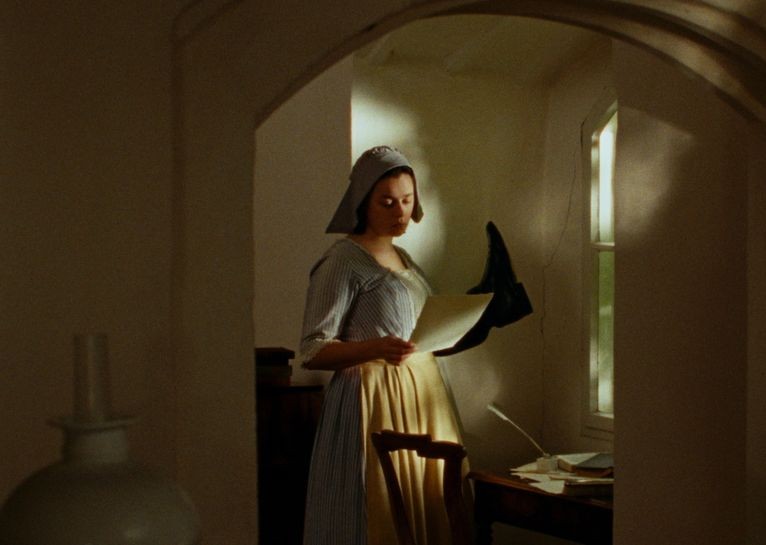Julian Radlmaier’s “Phantoms of July” (2025) combs magic and whimsy into the everyday. Set in the German town of Sangerhausen, it riffles through history and fantasy with a matter-of-fact, winking play to present something light-footed yet pulsing with politics and tender, aching depth. A marvellous blue stone is poised as the incantatory refrain across the segments.
It’s one of those seemingly regular things that takes on extraordinary potential. Women across the eras encounter it and are struck by something it seems to spark. Radlmaier abstains from excesses, like overtly expressing this quaking shift. It’s as if the stone expands the horizon for the women, teasing a thrilling, satisfying disruption of the mundane. It suggests transcendence could be possible, snatched with spirited verve.
A maid working for the 18th-century German poet Novalis, Lotte (Paula Schindler), complains about being trapped in a never-ending cycle of cleaning pots. She regrets the dullness, the limitations. She might have already accepted it. But the stone widens the ambit, though only fleetingly, tragically. She pines to embark on epic adventures, go see the world, while her co-workers are bewildered by her sudden pang of yearning. The rest have accepted their fates, telling her there’ll be rewards waiting after death. Lotte isn’t so convinced.
The stone sharpens her scepticism, amplifies a sense of proactive courage. She surges to act on her destiny and tweak it. But of course, her ambition might just be dented by the ever-hovering constraints. The stone reawakens her, but the period, impositions on womanhood will only put her under. Punishment is inevitable for those straying. This is only the shortest of the three sections, swiftly followed by a window into the present-day Ursula’s (Clara Schwinning) ennui.
Straddling two glum, thankless jobs as a waitress and a cleaner at a furniture store, Ursula is bewitched by a trio of itinerant musicians traipsing through the town. Their bohemian energy, carrying unapologetic, youthful possibility, strikes a fire deep within her.
As much as she tries to wrest away her wanting stare, she cannot resist. Their darting presence becomes an invocation for her to break the monotony, embrace surprise. Ursula, who has fallen into a stale pattern of living, can barely envisage being different until the trio interrupts her routine. Both for Lotte and Ursula, life and work are coiled in mechanical, drab repetition, bereft of wonder and discovery.
A rose town, Sangerhausen, has a vivid history on its walls. A burst of exploration comes through in Ursula’s walks around the town with Zulima, one of the musicians. For the first time in a while, Ursula turns bolder, livelier, craving to unleash herself beyond the strangleholds of duty. Moreover, commitment to her husband and work recedes, supplanted by a taste of something new, exhilarating. A mining hill hovers in the distance. Ursula says the heap keeps looking different.

Ursula’s chapter wends into Neda’s (Maral Keshavarz), a jobless Iranian wannabe travel influencer. The latter reunites with her old friend from Tehran. But the film’s dreamlike folds slice tangible surfaces, situating guilt and desire within the fanciful.
Amidst these are pockets of absurd humour: a dog owner who prods all to guess its name, two naked men popping up every now and then, exotic camel rides. Ghostly apparitions drift to prop up unresolved conversations, things that haven’t been mediated previously. Individual loneliness finds a seam of empathy and humanity, blending Ursula, Neda, and a Korean tour guide in an adventure that also blurs temporality.
Radlmaier summons delight in evanescence, airy gestures suffusing a world of grim politics. There’s a considerable exclusionary political atmosphere, the news blaring rancid right-wing jingoistic anxieties. Why is it that refugees are getting all the doctor’s appointments and Germans are struggling to? Amidst the purposely vitiated ecosystem propagating hate rhetoric, how do citizens tether to dignity and empathy for the hapless outsider? How can there be compassion instead of anger and spite?
In the small bubble of strangers coming together by accident, “Phantoms of July” poses a sublime riposte to a world that comes down heavy on difference and outsiders. Unexpected communities people form to prime their own resistance, tempered with spry mischief.
Sometimes, it takes stark strangers to uncloak what one has repressed, hidden from oneself. This baring unfolds with casual insouciance. Radlmaier spins connections gracefully, resplendently, clouds between the past and present fantastically parting. Cutting across vectors of nationality, ethnicity, and economic stratum, “Phantoms of July” knits generations in a wondrous, lithe plea for stretching one’s limits.



![Come Here [2021]: ‘Berlinale’ Review – Vague Thai diversion explores cinema that denies a definition](https://79468c92.delivery.rocketcdn.me/wp-content/uploads/2021/03/Come-Here-1-highonfims-768x576.jpg)



![It Must Be Heaven [2019]: ‘MAMI’ Review – An Absurdist Observational Comedy Wrapped in a Meta-Critic of Political and Societal bounds](https://79468c92.delivery.rocketcdn.me/wp-content/uploads/2019/11/It-Must-Be-Heaven-highonfilms-768x295.jpg)
